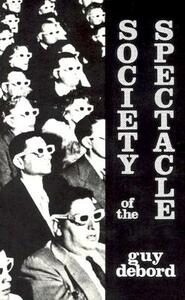Take a photo of a barcode or cover
Though I get the idea, I guess I'm too dumb to understand it fully and in detail.
challenging
informative
slow-paced
challenging
informative
reflective
I really liked it, but also had a tough time with the middle part as someone who isn't a native English speaker.
Overall 3.5/5 (started as a 5, but tapered off and ended around a 2, averaging 3.5)
The main concept of the titular Society of the Spectacle (as well as its various machinations and effects) is brilliant. Although written in the 1960's, this book is remarkably prescient into how even present-day incarnations of the spectacle (social media, entertainment/news industry, gig economy, etc) operate to ensure that the current cultural/economic hegemony persists in perpetuity. Along with this is the particularly compelling idea that the "spectacle" can metastasize and auto-replicate, creating a situation where the illusion becomes more real (and desired) than reality. The descriptions of mass consumerism and commodity fetishism and comparing them to religious fervor/behavior is also a fitting analogy. All of this leading to further alienation of the modern person. This trend shows no signs of slowing down and will likely continue as AI, VR, etc, continue to develop.
That being said, as insightful as the opening chapters are, there are diminishing returns over the remaining chapters. The next chapters outline Debord's thoughts on the themes of revolution, history, time, and culture. There are a couple of note-worthy aphorisms in these sections, for example, his critique of Soviet Russia and how the revolutionary class once it is in power ceases to be revolutionary instead becoming authoritarian itself, his tracing of the "ideal world" over different eras of European history, etc. However, these sections become increasingly obtuse and convoluted, becoming more and more tedious to read. He would have been better off keeping this already short book shorter and sticking to his main thesis.
The main concept of the titular Society of the Spectacle (as well as its various machinations and effects) is brilliant. Although written in the 1960's, this book is remarkably prescient into how even present-day incarnations of the spectacle (social media, entertainment/news industry, gig economy, etc) operate to ensure that the current cultural/economic hegemony persists in perpetuity. Along with this is the particularly compelling idea that the "spectacle" can metastasize and auto-replicate, creating a situation where the illusion becomes more real (and desired) than reality. The descriptions of mass consumerism and commodity fetishism and comparing them to religious fervor/behavior is also a fitting analogy. All of this leading to further alienation of the modern person. This trend shows no signs of slowing down and will likely continue as AI, VR, etc, continue to develop.
That being said, as insightful as the opening chapters are, there are diminishing returns over the remaining chapters. The next chapters outline Debord's thoughts on the themes of revolution, history, time, and culture. There are a couple of note-worthy aphorisms in these sections, for example, his critique of Soviet Russia and how the revolutionary class once it is in power ceases to be revolutionary instead becoming authoritarian itself, his tracing of the "ideal world" over different eras of European history, etc. However, these sections become increasingly obtuse and convoluted, becoming more and more tedious to read. He would have been better off keeping this already short book shorter and sticking to his main thesis.
Petered out and it was due at the library! Planning to pick it back up later.
Tam olarak nasıl ifade edeceğim bilemiyorum ama kitap beni rahatsız etti. Sanki tam bir gerçeğe/gerçeklere yaklaşacak ama bunu yapamıyor. Yan yola sapıyor. Etrafından dolanıyor. Demek istediğini ifade edemiyor. Sanki bir iç dökme mi desem, öfke patlaması mı? Hani bir an büyük bir kızgınlıkla, haklı olduğuna inanarak, geri dönülmez bir biçimde, biriktirdiğin ne varsa dökersin ama sağlam kafayla çok da haklı olmadığını anlarsın. Sonra da yaşamının geri kalanında, o patlamadaki haklı olduğun küçük parçacıklara tutunur, hatta bunu saplantı haline getirerek yaşarsın. Böyle bir karakter canlandı gözümde nedense.
30.12.20 [2/5]
i do not think i have the mental capacity required to understand this text. i am also fairly certain that i am ok with that right now; that whatever there is to be had can be got better elsewhere. i enjoyed the struggle over the early epigrams. something profound and very close to my experience of the modern world exists there, even (or perhaps especially) over 50 years later. but the later section were bogged down in obfuscated analysis of art and time and history and the ussr in a way i did not find appealing or enlightening.
despite my conviction of obsolescence, i intend to re-read (and therefore re-evaluate) this text at a later date
i do not think i have the mental capacity required to understand this text. i am also fairly certain that i am ok with that right now; that whatever there is to be had can be got better elsewhere. i enjoyed the struggle over the early epigrams. something profound and very close to my experience of the modern world exists there, even (or perhaps especially) over 50 years later. but the later section were bogged down in obfuscated analysis of art and time and history and the ussr in a way i did not find appealing or enlightening.
despite my conviction of obsolescence, i intend to re-read (and therefore re-evaluate) this text at a later date
Alternates between brilliant analysis of late capitalism - or, how the bourgeoisie stopped History - and utterly turgid critical theory. The middle sections are basically unreadable.




